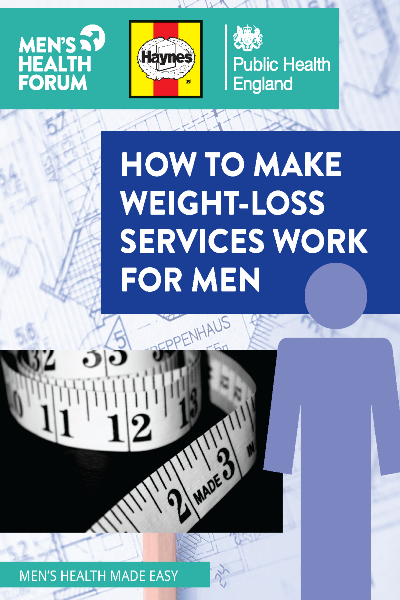A new ‘How to’ guide launched today by the Men’s Health Forum and supported by Public Health England is the first to show how to adapt and run weight-loss programmes so they are tailored specifically for men.
A shocking 67% of men are overweight or obese which is significantly more than women at 58%, yet men are much less likely to join weight-loss programmes. Only 10-30% of those in weight-loss programmes are men and  some weight-loss programmes attract almost no men.
some weight-loss programmes attract almost no men.
The evidence-based guide, ‘How to make weight-loss services work for men’, aimed at local authorities, commissioners and weight management providers, follows important new research, led by the University of Aberdeen with the University of Stirling and Bournemouth University, looking into male attitudes and behaviour in relation to health. It showed that the majority of weight management programmes are regarded by men as ‘feminised spaces’ and they often feel uncomfortable joining.
In addition being ‘big’ may be regarded as a good thing by some men as socio cultural influences can encourage a larger more masculine body. Men may also not know or care if they have a weight problem and tend to be more cynical about ‘health messages’.
The guide offers advice for local authorities, commissioners and weight management providers, who are trying to attract men to weight-loss programmes. The guide highlights:
- Programmes that include exercise and behaviour change components as well as dieting are more successful in helping men to lose weight.
- Men respond well to programmes that have a higher degree of personalisation, such as setting individual goals, as it increases their sense of control.
- Weight-loss programmes based in the workplace or associated with professional sports clubs have been particularly successful.
- Using humour and encouraging camaraderie makes programmes more attractive to men as does knowing that there will be other men there.
- NHS programmes have a higher referral rate compared to private programmes illustrating the crucial role of NHS staff in encouraging men to join.
- Offering a ‘male only’ group may make it more likely for men to join.
- Use of a pedometer and ‘gadgets’ also make programmes more appealing.
Martin Tod, the Men's Health Forum's chief executive, said:
Men are not getting the services they need on weight-loss either from the NHS or commercial providers. Even though men are more likely than women to be overweight and obese - and more are likely to die from weight-related disease - men are still only a small minority of those in NHS-funded weight-loss programmes.
It is crucial that local government and the NHS put the guidance into practice and develop programmes that appeal to and work for men. Otherwise men will continue to dis-proportionately suffer from avoidable disease and unnecessarily early death.
Professor Kevin Fenton, national director of health and wellbeing at Public Health England, said:
Weight-loss programmes have conventionally disproportionately targeted women and now is the time to address the gender imbalance. This guidance presents a vital opportunity for local authorities, commissioners and weight management providers to support men to lose weight and ultimately improve their health.
Being overweight or obese significantly increases your risk of developing heart disease, type 2 diabetes and colon cancer, all of which are preventable. Cutting calorie intake by having smaller portions and eating healthier meals, snacks and drinks alongside being more active can help us lose weight and lead healthier longer lives.
-
Top tips and download How to make weight-loss services work for men
-
Buy How to Make Weight-Loss Services Work for Men (How to Guides)
